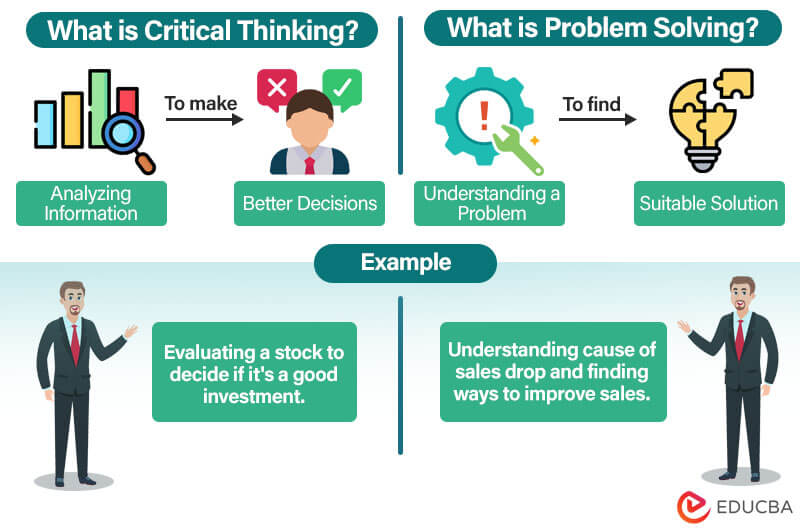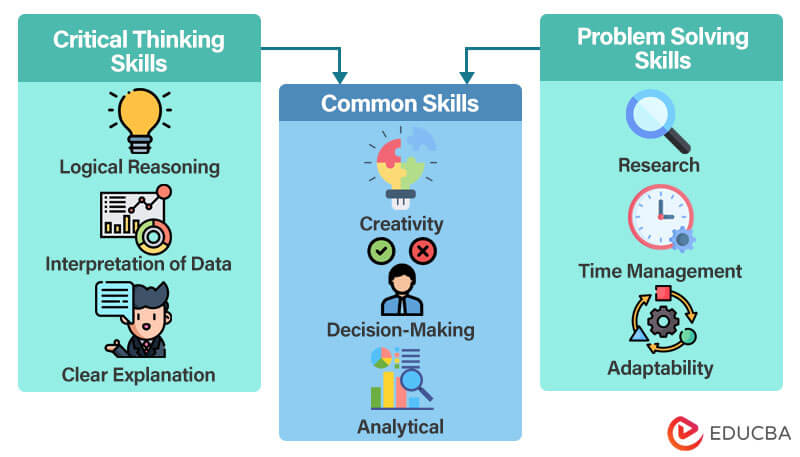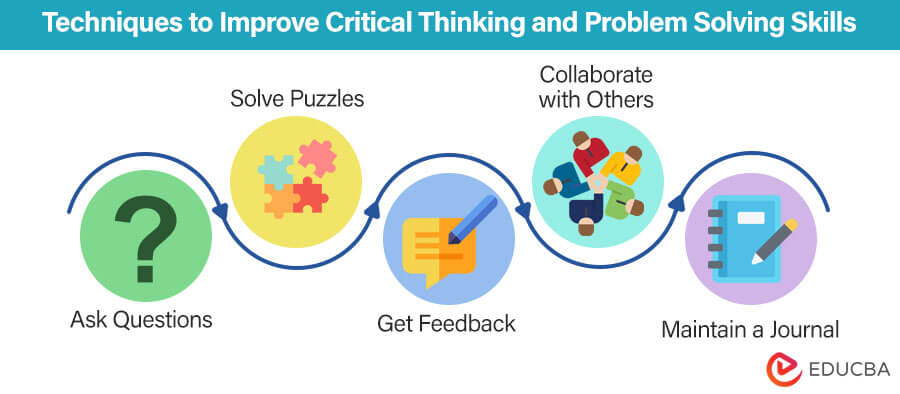
Table of Contents
What is Critical Thinking and Problem Solving?
Critical thinking and problem-solving skills are crucial to survive and succeed in today’s increasingly complex life. Rather than just collecting information, we need to be able to think fast and make effective decisions quickly. Moreover, we need to think about ourselves as well as everyone else involved and come up with a quick, effective, and practical solution. Here is where critical thinking and problem solving come in. Employing your critical thinking and problem-solving skills will not only help you personally but will also benefit society.
Critical thinking and problem-solving have similarities and differences in advantages, improvement methods, and more. This article will cover everything that is similar as well as that differs for both skills.
Critical Thinking Meaning
Critical thinking is when you think about ideas carefully and ask questions to understand information in a better way. It means processing information in multiple ways, thinking about the topic from different angles. It helps cover all aspects of an issue or idea before taking action, which helps make sensible and thoughtful life decisions.
Example
Imagine Agatha, a passionate and ambitious entrepreneur, running a successful tech startup. However, the demand for her main product is falling because her competitors are rising with the use of new cutting-edge technology.
Solution
Rather than giving up, Agatha arranges a brainstorming session with her team. They use the SCAMPER (Substitute, Combine, Adapt, Modify, Put, Eliminate, Reverse) technique to analyze their product and determine how to increase its demand. Using this critical thinking technique, Agatha and her team realize that they need to upgrade their product. After evaluating all aspects of the issue, they conclude that rather than improving their product, they must steer their business towards providing consultancy services to the new companies entering the technology world. Their valuable expertise and resources help them revive their business.
Problem Solving Definition
Problem solving is the step-by-step process where you first identify the main problem as well as other small relative issues, collect information and use this data to find a practical solution. Being proficient in this skill will help you solve any issue easily and quickly in all areas of your life.
Example
Ben, a product manager at a top firm in Los Angeles, is currently working on launching a new product. After completing the product design & manufacturing, the team prepares for the launch. However, as the company faces financial challenges, Ben is told to keep the expenses for the launch minimum.
Solution
Rather than just accepting the situation, Ben uses his problem-solving skills to find a way to get the necessary funds. First, he works to find the cause of the financial constraint. He finds that due to simultaneous advertising of other products, there is excessive spending. So, he creates a presentation to ask the higher management to stop advertising the company’s other products except for the best-selling products. This way, they can move the funds to this launch, and the customer’s sole focus will be on the launch, making it a hit.
Critical Thinking and Problem-Solving Skills
Apart from a few common skills, several skills are specifically fit for each individual. In this section, we first see the skills common between both and then the differing skills.
Common Skills
Along with each skill, we added a technique to help you practice and improve your skill.
1. Analysis
It is the ability to understand the information by breaking it into smaller pieces of data and then analyzing each aspect individually to find an effective solution.
Six Thinking Hats Technique: Developed by Edward de Bono, this technique suggests that you use six different thinking styles or perspectives (hats) while analyzing an issue.
2. Creativity
When you have to think about one single topic in several different ways, you need a creative approach where you find the connection between seemingly unrelated subjects.
Fishbone/Ishikawa Diagram Technique: This diagram contains all possible causes for the presented problem, which can help us identify the leading causes quickly.
3. Decision-Making
A necessary step in critical thinking and problem solving is the decision-making process. Here, you need to collect all the initial information, weigh the pros and cons, give your input, and arrive at a final decision.
Decision Matrix Technique: It is a matrix that checks how effective various solutions can be to solve specific criteria.
Differing Skills
| Critical Thinking | Problem Solving |
| Evaluation: Before accepting or rejecting a solution, it is necessary to evaluate if the source is valid and if the information is relevant and of high quality. | Research to Collect Information: Collecting relevant, correct, and valid information is vital for solving an issue. |
| Interpretation: It is the skill of interpreting, i.e., understanding the purpose, motive, and meaning of the presented data accurately. | Collaboration: Take inputs from several people regarding the issue to get diverse perspectives and expertise, which can help you arrive at comprehensive solutions. |
| Explanation: To share your knowledge, you need effective communication skills. That way, you can present and explain your ideas to others clearly. | Resilience & Adaptability: Encountering challenges while trying to solve a problem is common. Thus, you must be able to adapt to changes and continue through setbacks. |
| Logical Reasoning: It is the most crucial aspect of critical thinking, where you must find or create proper reasons/evidence behind your actions before using them. | Time Management: Most of the time, problem solving is time-sensitive and urgent. Thus, allocate your time efficiently so that you can prevent any delays. |
Why is Critical Thinking and Problem Solving Important?
Common Advantages
- Adapting to Change: Once you master the skill of critical thinking and problem solving, you can quickly adapt to any change in your life. It is because both skills require you to keep going through any unexpected or unfamiliar situations and challenges.
- Better Decision Making: Once you learn to analyze and evaluate information comprehensively, you see every decision as a problem and use critical thinking or problem solving to make the best decision for you and everyone else.
- Enhanced Creativity: When you practice critical thinking and problem solving often, your mind becomes used to viewing every detail in a creative manner. It then encourages you to think differently in every situation.
Differing Advantages
| Critical Thinking | Problem Solving |
| Effective Communication: By thinking critically, you learn to organize and express your ideas clearly and logically, making it easier for others to understand. | Goal Achievement: As the main idea of problem-solving skills is to resolve an issue, it makes you goal-oriented and teaches you to achieve your goals no matter what. |
| Enhancing Learning: Once you start understanding everything rather than just memorizing, your learning experience enhances. | Conflict Resolution: Being able to solve critical problems allows you to navigate through conflicts and find mutually agreeable resolutions easily. |
| Promoting Innovation: Thinking about every aspect of a subject leads you to see ideas and opportunities that others may not see. | Boosts Confidence: Each time you tackle a challenge successfully, you become more confident in your skills and abilities. |
How to Improve Critical Thinking and Problem-Solving Skills?
Common Techniques
1. Be Inquisitive
The best thing one can do to improve their critical thinking and problem-solving skills is to ask questions. Asking questions whenever you encounter a new or unknown situation will help you gain knowledge and a deeper understanding of the subject.
2. Solve Puzzles
Working on brain teasers, puzzles, sudoku, etc., will help you think logically, creatively, and sometimes within time constraints. All this improves your ability to think critically and solve problems easily.
3. Encourage Feedback
Ask your trusted colleagues, friends, family, and social network for feedback on your presentation skills, communication skills, ideas, written blogs, etc. It will help you improve several necessary skills, improving your critical thinking and problem solving skills.
4. Keep a Journal to Practice Self-Reflection
After every problem or conflict you resolve, write it down in a journal. It will help you go back to your past experiences and either improve our methods or help your decision-making process.
5. Collaborate with Others
Engaging in debates, group discussions, book clubs, etc., helps you learn how others think and analyze situations. This broadens your perspective and enhances your skills.
Differing Techniques
| Critical Thinking | Problem Solving |
| Read Widely & Stay Informed: Expanding your knowledge is a crucial habit to improve your critical thinking skills. Thus, read books, and scientific journals, keep up with the news, etc. | Break Problems Down & Encourage Creativity: When you face any complex problem, always break the issue into smaller tasks and enforce creative thinking to find solutions. |
| Collect Credible Information: Before accepting any suggestions and decisions, always ensure the information comes from a valid source, and you completely understand every detail of it. | Learn from past mistakes: If you are solving an issue similar to a problem you solved in the past, think about it and learn to avoid any similar mistakes. |
| Listen Actively: Learn to pay attention to someone who’s speaking and listen actively. It lets you understand the speaker’s perspective and reasoning on the topic. | Stay Persistent: When solving one problem, it is evident that there will be smaller issues arising. Thus, you need to stay positive as well as determined. This way, you can solve the main problem despite all the challenges. |
Critical Thinking vs. Problem Solving – Comparison Table
| Aspect | Critical Thinking | Problem Solving |
| Definition | It is the process of breaking information down to analyze and evaluate it to make informed decisions. | It is the process of finding the cause of a problem and determining the best way to resolve it. |
| Focus | Analyzing and evaluating information, arguments, or situations. | Identifying the problem and generating the best solution. |
| Process |
|
|
| Application | Academic settings for research, debates, evaluating arguments, etc. | Business, engineering, project management, etc. |
| Outcome | Easily understand complex issues, make sound judgments, and make reasonable arguments. | Efficiently overcome challenges, achieve goals, and provide excellent solutions for any issue. |
| Integration | The main aim of using critical thinking is to provide a reasonable solution to any personal or professional problem, whether small or big. | While solving a problem, a person requires critical thinking to check if the solutions are valid and the best course of action. |
Frequently Asked Questions (FAQs)
Q1. What are the 6 stages of critical thinking?
Answer: Proposed by Richard Paul and Linda Elder, the six stages of critical thinking are as follows:
- Unreflective Thinker: It is when you just go with your instinct, guts, and emotions.
- Challenged Thinker: When you face a situation that goes against your belief, you start questioning your beliefs and biases.
- Beginning Thinker: At this stage, you start critical thinking by questioning everything and believing facts based on evidence and reasoning only.
- Practicing Thinker: Now, you start applying your critical thinking skill to every situation.
- Advanced Thinker: Once you practice the skill enough, you can easily and quickly resolve any issues by making accurate judgments.
- Master Thinker: This is when you become an expert critical thinker and make well-thought decisions exceptionally quickly.
Q2. What is the AAA approach to critical thinking?
Answer: The AAA approach in critical thinking consists of three steps: Ask, Assess, and Assert. It involves asking relevant questions, assessing the information critically, and then making a well-structured assertion (claim) based on the evidence.
Q3. Courses to learn problem-solving skills.
Answer: Courses to learn problem-solving skills:
- Data Analysis and Data Science
- Project Management
- Computer Science and Programming
- Mathematics and Logic
- Problem-Solving and Decision-Making
- Critical Thinking
Recommended Articles
This article guides you through the various similarities and differences between critical thinking and problem solving. We explore its meanings with examples, skills, and their importance. We have also mentioned methods that you can use to improve these skills. To learn more about similar topics, visit the recommended articles below.


